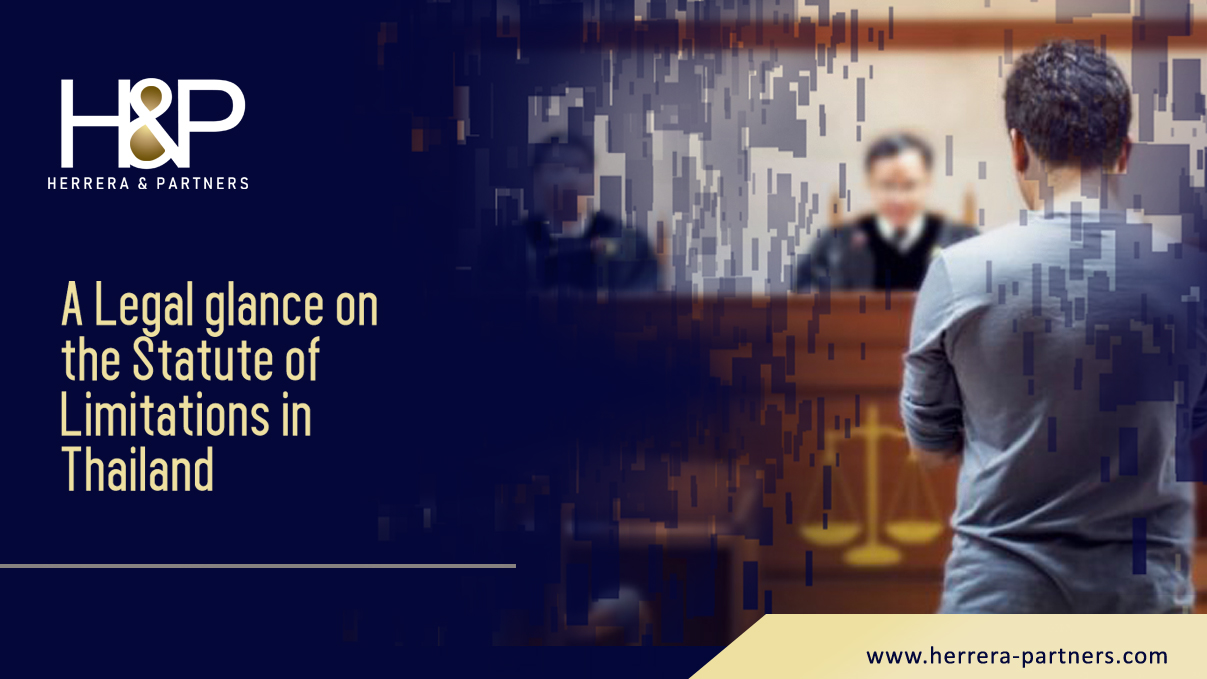
The statute of limitations is the first relevant aspect to check before considering starting a lawsuit in Thailand. It is well known that the court proceedings in Thailand are long and costly, therefore it is essential to understand if our client is on time to start a lawsuit. H&P lawyers in Thailand understand the importance to advice correctly our clients on the prescription of the rights to sue before starting legal proceedings at Civil and Criminal Courts of Justice in Thailand.
By definition, a statute of limitation or prescription is the period stipulated by law set out the maximum duration the parties involved have, to initiate legal proceedings, whether civil or criminal.
When the specified time in a statute of limitation passes, a claim might no longer be filed and may be subject to dismissal if the defense against that claim is raised that the claim having been filed after the statute of limitations period with reference to the Thailand Commercial Code of Conduct (CCC), Article 193/9 and 193/10.
The Article 193/9 stipulates: “A claim is barred by prescription if it has not been enforced within the period of time fixed by law” and the Article 193/10 indicates: “After the lapse of the period of prescription for claims, the debtor is entitled to refuse performance”.
Based on our experience, in the proceeding of a Civil Lawsuit in Thailand, even the statute of limitation is considered as a ‘Legal Issue’, the judge might not consider to dismiss the lawsuit without the defendant’s opposition against such statute of limitation. This is because the statute of limitation in Civil lawsuit is not the legal issue which relates to public order or good morals in accordance to the Civil Procedure Law Article 142(5)
In contrast, the Criminal Procedure in Thailand is absolutely different from the Civil Procedure in terms of statute of limitation.
If a criminal lawsuit filed to the court has passed the statute of limitation, the judge could consider to dismiss the lawsuit without the defense opposing against the statute of limitations. The Criminal Law’s purpose is to protect the right and freedom of accused or defendant in accordance with the Constitutional Law of the Kingdom of Thailand. Hence, the statute of limitation in a Criminal lawsuit in Thailand is considered relating to the public order or good morals. This refers to the Criminal Procedure Law article 185:
‘If the court is of opinion that the accused has not committed the offence, or that the acts done by him do not constitute an offence, or that the case is barred by prescription, or that three are legal grounds upon which the accused ought not to be punished, the court shall dismiss the case and release the accused; but pending final judgement, the Court may, if it thinks fit, grant the accused provisional release’
The statute of limitation of claims and offences were mostly stipulated in Commercial Code of Conduct and Criminal Code of Conduct which consider on the ground basis, such as the following claims and offense. On this regard the CCC Article 193/31 stipulates:
‘The period of prescription for claims of the Government for taxes and rates is ten years. As to other claims of the Government relating to obligations, the provisions of this title shall apply.’
And the CCC Article 193/32 indicates: “The period of prescription for a claim established by a final judgment, or by a contract of compromise is ten years, even if the claim itself is subject to any period of prescription”.
And the Criminal Code Article 96; Subject to Article 95, in case of compoundable offence, if the injured person does not lodge a complaint within three months as from the date of offence and offender to be known by the injured person, the criminal prosecution is precluded by prescription”
If you need legal advice on the statute of limitations in Thailand or you need legal representation to start a lawsuit in Thailand, please contact H&P lawyers in Bangkok at [email protected]


